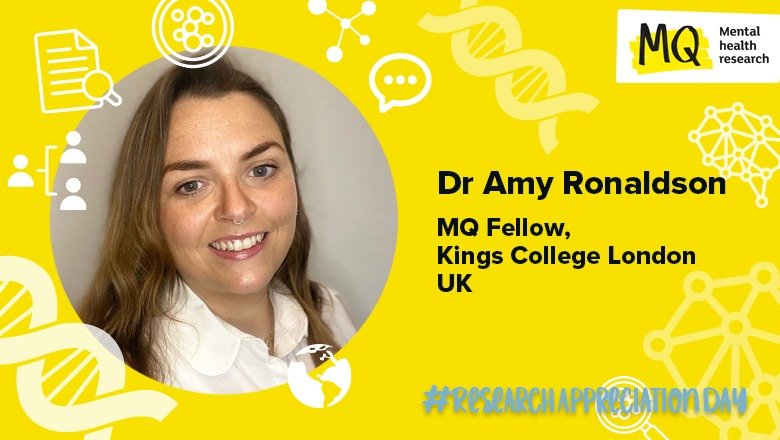Research Appreciation Day: Introducing Dr Amy Ronaldson

On 5 July, MQ Mental Health Research is excited to enjoy with you our first ever Research Appreciation Day – a day to take a moment to recognise just how vital research is to improve our world. There are so many amazing people dedicating their lives to improving our lives through choosing a career in research. So we thought we’d introduce you to some of them, so please meet some of our recent fellows.
Research Appreciation Day – Introducing Dr Amy Ronaldson
Name: Dr Amy Ronaldson, MQ Fellow 2022, King’s College London, UK
Career background: Psychology and psychiatry research
Current research: Mental health interventions; mental health and infection
What’s the day-to-day life of working in research like?
I would say the day-to-day life of a researcher is quite varied and can be rather unpredictable.
In my field (mental health data science) one day might be spent analysing data for one project, whereas the next is spent writing a scientific paper for another. This, of course, is punctuated with meetings, research collaborations, administrative tasks, and teaching duties (potentially).
It is a varied and rich working life, but planning can be difficult – you need to be flexible, and the ability to self-motivate is essential.
What drawbacks are there in data collection? How can these be addressed?
There are many pitfalls when it comes to collecting data but the main one, I would argue, is bias. In mental health research, a lot of data is collected using questionnaires. Although questionnaires can provide you with rich data, it can mean that we end up excluding people less likely to take part in research. This can lead to research findings not necessarily being applicable to certain populations, and so the results of the study lack ‘generalisability’.
Within mental health research, we are now seeing an increase in the use of ‘routinely collected data’. This is data collected for purposes other than research and can include things like electronic health records. Using this data means we can include large sections of the population in our studies, reducing bias and making our results more generalisable.
This is not to say that routinely collected data is not without its pitfalls. Missing data and data errors can pose problems for researchers. I think the take-home message here is that research is often a fine balancing act.
What’s your favourite part of a study?
As a mental health data scientist, I use special statistical software to analyse data and produce results. You can spend weeks, months, even years collecting or obtaining data, and getting it ready to analyse.
The absolute best part of the research process is when the data is finally ready, and you can press the ‘go’ button on the statistical software to run statistical tests and see what the answer to your research question is. The lengthy data collection process culminates with the click of a mouse…its all rather exciting (albeit disappointing sometimes).
What’s the best thing about working in research?
For me there are three ‘best things’: creativity, discovery, and impact.
Although research involves structure and rigorous methodology, it is also a very creative process. As researchers, we get to be creative around (a) the questions we ask, (b) how we answer them, (c) and how we present these findings.
In terms of ‘discovery’, this is essentially what research is – we seek to discover, and this is incredibly exciting and rewarding.
As for ‘impact’, seeing the findings of your research work lead to actual change for people (e.g. raising awareness, health policy change) is what it’s all about really.
Tell us about your 2022 Fellows programme research – it sounds exciting!
I started my MQ Research Fellowship at the start of April this year and am in the process of getting all my studies set up. I plan to use routinely collected data (electronic health records in my case) to understand why people with severe mental illness are more likely to die from infectious diseases than people without severe mental illness.
I have always been interested in links between mental and physical health, but most work in this field focuses on the non-communicable aspects of physical health (e.g. heart disease, diabetes). In the wake of the COVID-19 pandemic, we are now seeing how people with severe mental illness had much worse COVID-19 outcomes being more likely to be hospitalised, and to die from the disease. This inspired me to think more widely about the relationship between mental health and vulnerability to infection which is a surprisingly under researched area.
When I found out that MQ were going to support this work I was over-the-moon of course and felt really encouraged that MQ also recognised the importance of looking at infection risk in the context of mental health. I really look forward to sharing my findings with you all!
Source link
#Research #Appreciation #Day #Introducing #Amy #Ronaldson

